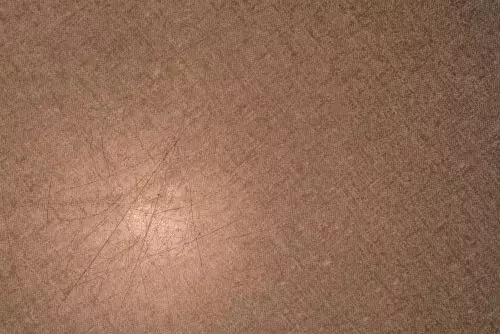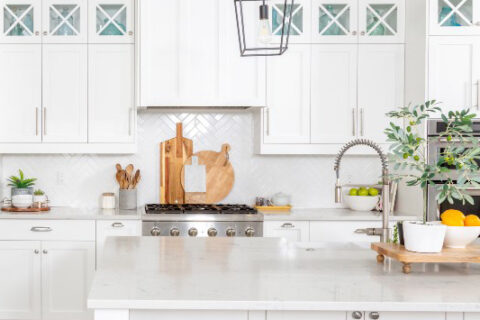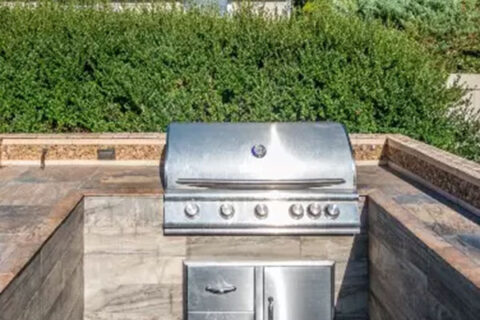6 Common Kitchen Countertop Problems and How to Fix Them
Even the most durable countertops can encounter problems, especially if they aren’t properly maintained. Here are seven common countertop problems along with some tips for getting them fixed.
Chemical Stains
The composition of your countertops should determine the kind of cleaner you use. If you mistakenly use a harsh chemical cleaner on marble counters the devastating effects can appear immediately. Granite, on the other hand, tends to seem fine initially only to diminish in shine and quality over time due to regular exposure to harsh cleaners.
Once your granite has lost its sheen, you may be able to get it back by hiring a professional to buff and re-polish the surface. That said, this isn’t the type of project you should try yourself, or you will risk making the problem much worse.
Ideally, it’s best to avoid problems in the first place by using the right type of cleanser on your countertops. It’s important to remember that most chemical cleaners are too harsh for granite and marble surfaces. For everyday cleaning, use ordinary soap and warm water. If you do use a brand-name cleaner, make sure it’s designed specifically for granite or marble. It may cost more, but the right cleaner can help preserve the shine and life of your countertops.
Food Stains
Although properly sealed countertops are highly resistant to stains, they aren’t completely impervious. Wine, oils and even fruit juice can often penetrate the surfaces and leave unsightly stains. You can try removing oil stains using a homemade paste made from baking soda and acetone. For organic stains, try soaking a paper towel in bleach and then placing it over the stain.
Most importantly, guard against stains by ensuring that your countertop is protected by a high-quality sealer. You should also wipe up spills as soon as they happen.
Splitting Seams
If you notice your countertops moving and can see the joints separating under pressure, it’s a sign the adhesive has weakened. Before things get worse, contact a professional to remove the failing adhesive and replace it with a fresh, more durable option. Avoid trying to replace the adhesive yourself or you could end up causing even more damage.
Ruptured Surfaces
A ruptured countertop can seriously harm the look of a kitchen. Most homeowners worry that a rupture means they need to replace their countertop surfaces. If the damage is isolated, however, you can have the damaged slab repaired without impacting other areas.
Ruptures can occur for several reasons, including:
- Poorly crafted joints
- Placing too much weight onto one area
- Not giving glue enough time to dry during installation
- Countertops installed atop uneven surfaces
Repair methods depend on the extent of the damage. For minor cracks, an adhesive may work. For deeper fissures or damage caused by excessive weight, you will probably have to have the damaged slab removed using a drill. You will then have to have the crack sealed using special filling material. To maintain a uniform look, it’s best to hire a professional who will use a filler that blends seamlessly with the existing countertops.

Scratches
If you have granite countertops, scratches shouldn’t be a major problem. Still, it’s a good idea to avoid sliding rings with precious stones across the surface. If you do notice some minor scratching, you can usually eliminate it by gently polishing the surface.
Heat Damage
Despite being as durable as rock, stone countertops can crack or discolor when exposed to extreme heat. Using trivets, potholders and other barriers will help prevent damage. But what if you’ve already made a mistake?
When you repeatedly place hot pots or dishes on countertops, you can cause black marks and, in some cases, even cracks. Extreme heat can also affect the sealer, making granite susceptible to staining and acid damage. For black marks, you can try using toothpaste to clean the surface. If this doesn’t work, try re-polishing the surface. Unfortunately, if the damage is severe, there may be no other choice but to replace the affected slab and then use better judgment going forward.
When it comes to avoiding problems with kitchen countertops, it helps to have them installed by a reputable contractor. Rock Solid has gained a well-earned reputation for being the best, most reliable granite counters supplier. An employee-owned company, we do it all ourselves without outsourcing any key jobs to subcontractors. When homeowners work with our skilled experts, they can expect beautiful natural stone countertops that stand the test of time.


